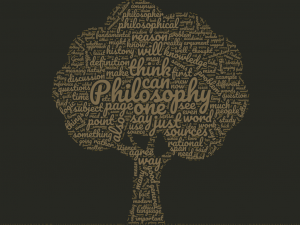7 Philosophy

Let’s move into this idea of philosophy. This chapter includes several videos. Here are the questions you might think about as you learn about philosophy.
![]()
- How do we know what we know?
- What is changeable within ourselves?
- How does what we know about the world shape the way we view ourselves?
- How do our personal experiences shape our view of others?
- What does it mean to be an insider or an outsider?
- What does it mean to “grow up”?
- Where do our definitions of good and evil come from?
- What is the relevance of studying multicultural texts?
- How does the media shape our view of the world and ourselves?
- What turning points determine our individual pathways to adulthood?
- What is changeable within ourselves?
Philosophy (from Greek: φιλοσοφία, philosophia, ‘love of wisdom’ is the study of general and fundamental questions about existence, knowledge, values, reason, mind, and language. Such questions are often posed as problems to be studied or resolved. The term was probably coined by Pythagoras (c. 570 – 495 BCE). Philosophical methods include questioning, critical discussion, rational argument, and systematic presentation.
Classic western philosophical questions include: “Is it possible to know anything?”, and if so, “Can we prove it?” Philosophers also pose more practical and concrete questions such as: “Is there a best way to live?”, “Is it better to be just, even if one could get away with being unjust?”, ‘do humans have free will?’
Major subfields of academic philosophy include metaphysics, which is concerned with the fundamental nature of existence and reality; epistemology, which studies the nature of knowledge and belief; ethics, which is concerned with moral value; and logic, which studies the rules of inference that allow one to deduce conclusions from true premises. Other notable subfields include philosophy of science, political philosophy, aesthetics, philosophy of language, and philosophy of mind. https://en.wikipedia.org/wiki/Philosophy
Let’s begin here with this question, Who am I? A philosophical inquiry.
Simone de Beauvoir
At the age of 21, Simone de Beauvoir became the youngest person to take the philosophy exams at France’s most esteemed university. But as soon as she mastered the rules of philosophy, she wanted to break them. Her desire to explore the physical world to its fullest would shape her life, and eventually, inspire radical new philosophies. Iseult Gillespie explores the life of the revolutionary thinker.
Let’s take another look at this philosophical question. How do you know what’s true?
So, we’ve taken a look at several philosophical questions. Let’s take a look at How the World Thinks according to Julina Baggini. He has traveled around the world looking at different ways the world thinks. There are two videos on his page. You’ll want to follow this link to listen to both videos. You may also want to listen to the podcast on the same page. (Note – his book is quite interesting as well.) How the World Thinks link.
Complete the following activity while you listen to the lecture on the website. It is the second video. How the World Thinks link.
So, next let’s take a closer look at The Philosophy of The Buddha
![]()
Wisdom and enlightenment are habits, or “practices,” not moments of realization. Can you think of other aspects of your life that grow healthier through habits, not single moments of success?
Think of three aspects of your life that cause you to feel anger or dissatisfaction. For each example, think of a way you could focus on changing your outlook, rather than your circumstances.
After some brainstorming and discussion, write some answers to these questions. You may want to do a little research as you write.
- How do we form and shape our identities?
- In a culture where we are bombarded with ideas and images of “what we should be,” how does one form an identity that remains true and authentic for her/himself?
- What turning points determine our individual pathways to adulthood?
- In a culture where we are bombarded with other people trying to define us, how do we make decisions for ourselves?
